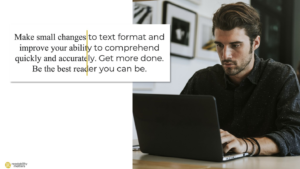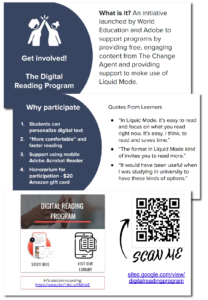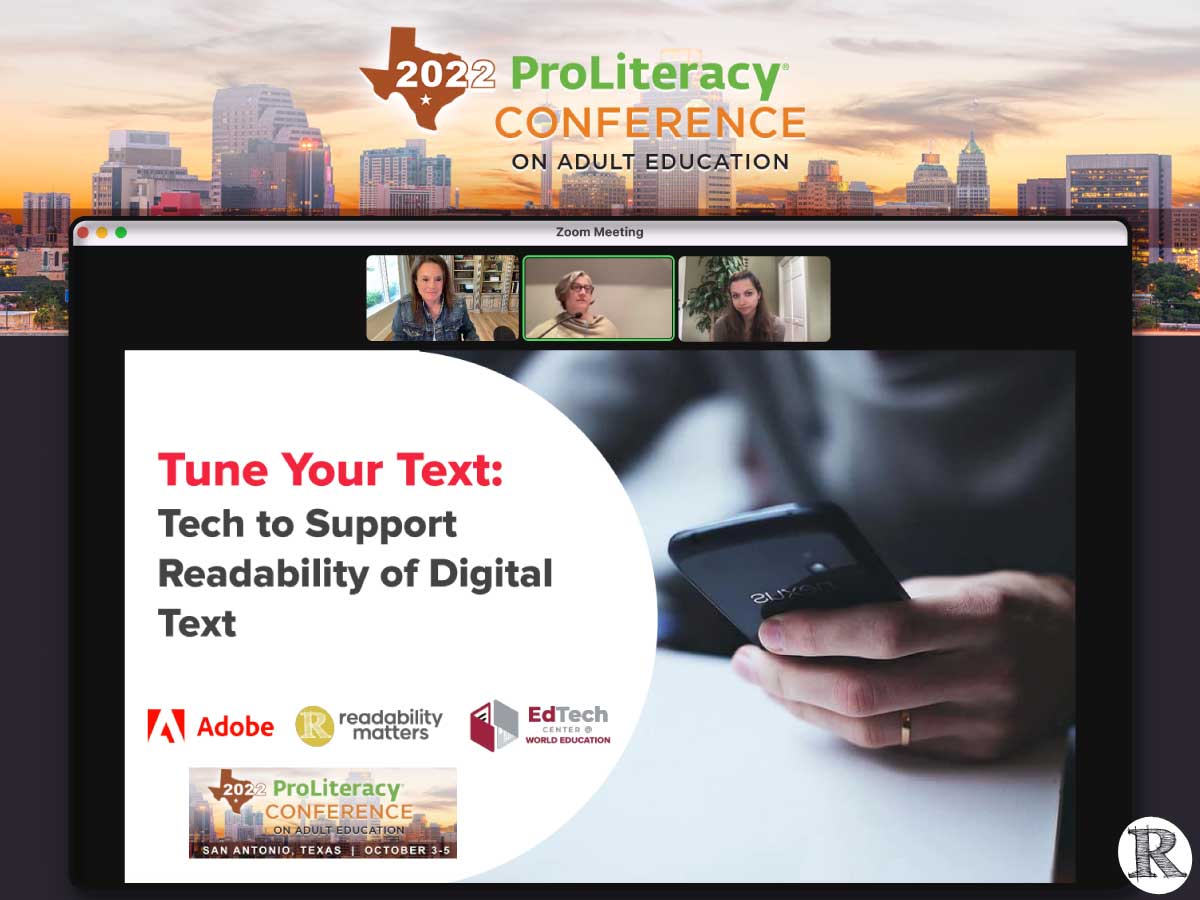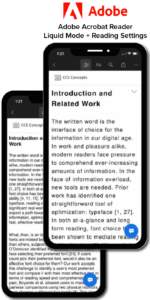Tune Your Text: Tech to Support Readability of Digital Text
 Readability Matters’ Founder, Kathy Crowley, joined Dr. Jen Vanek of World Education and Dr. Zoya Bylinskii of Adobe to share the latest work on Readability in Adult Education at the ProLiteracy conference in San Antonio. The talk began with Jen summarizing the importance of SmartPhone usage by students reading for Adult Education classes. She shared Pew Research data demonstrating that reliance on smartphones for online access is especially common among younger adults, lower-income Americans and those with a high school education or less. In fact, 32% of U.S. adults not graduating from high school report that they do not use broadband at home, but own smartphones.
Readability Matters’ Founder, Kathy Crowley, joined Dr. Jen Vanek of World Education and Dr. Zoya Bylinskii of Adobe to share the latest work on Readability in Adult Education at the ProLiteracy conference in San Antonio. The talk began with Jen summarizing the importance of SmartPhone usage by students reading for Adult Education classes. She shared Pew Research data demonstrating that reliance on smartphones for online access is especially common among younger adults, lower-income Americans and those with a high school education or less. In fact, 32% of U.S. adults not graduating from high school report that they do not use broadband at home, but own smartphones.
Setting the Stage: Readability For All
Kathy explained the importance of personalizing text format to support reading proficiency in both children and adults. She invited attendees to explore their own reading preferences, playing with the Readability Features in the Readability Matters Sandbox.
Adobe Acrobat Reader: Documents on Smartphones
Students attempting to read documents on SmartPhones have historically faced significant challenges, having to use pinch and zoom to size and navigate the text. Zoya demonstrated Adobe’s new AI-based Liquid Mode technology. With the addition of this new technology in the free Adobe Acrobat Reader, PDFs are readable on mobile devices. Liquid mode allows the user to reflow the text for the screen size; the provided Reading Settings enable user customization of text size, character and line spacing to support reader proficiency on these small devices.
Further, Zoya discussed Adobe’s Readability Initiative. Through Adobe Research, Adobe has invested heavily in ensuring high-quality implementations of better reading solutions in its products. Further, Adobe is a Founding member of The Readability Consortium (TRC), with Readability Matters, Google and the University of Central Florida. With the goal of reengineering reading, the TRC steers collaborative research, the creation of open-source tools for the growing readability community, and the development of big data around digital reading. The growing readability community invites technology and publishing companies to join the effort, ensuring research-informed solutions are deployed across all surfaces and applications where people read.
WorldEd and Adobe: Field Testing Liquid Mode
 Jen highlighted the Digital Reading Program launched by WorldEd and Adobe. Through this applied research project the team will evaluate how adult literacy students can take advantage of these new technologies to enhance their learning. In earlier pilots, Jen reports that students found Adobe Acrobat Liquid Mode with Reading Settings extremely valuable. The technology also allows for collapsing sections, allowing the students to focus on an area of interest.
Jen highlighted the Digital Reading Program launched by WorldEd and Adobe. Through this applied research project the team will evaluate how adult literacy students can take advantage of these new technologies to enhance their learning. In earlier pilots, Jen reports that students found Adobe Acrobat Liquid Mode with Reading Settings extremely valuable. The technology also allows for collapsing sections, allowing the students to focus on an area of interest.
WorldEd is inviting educators to get involved. Use the QR code to get more information about the program, including an introductory video.
Learn More:
Access the free Adobe Acrobat Reader tool here: https://get.adobe.com/reader/
World Ed’s Digital Reading Program: https://sites.google.com/view/digitalreadingprogram
Intro video: https://www.youtube.com/watch?v=gNUlvtGFXtQ&t=2s
Presenters:
 Dr. Jen Vanek: Jen is Director of Digital Learning and Research at the EdTech Center @ World Education. Jen leads projects in digital literacy, online learning, English language learning, and adult education. She is co-principal investigator for the 21st Century Learning Ecosystems Opportunity research project, a Walmart-funded study to describe characteristics of effective technology-rich and employer-supported adult learning. She also co-leads the Teaching Skills That Matter-SkillBlox Instructional Support Pilot, a design research initiative funded by the Institute for Educational Sciences focused on development of a free online application for curating, organizing, and evaluating open education resources.
Dr. Jen Vanek: Jen is Director of Digital Learning and Research at the EdTech Center @ World Education. Jen leads projects in digital literacy, online learning, English language learning, and adult education. She is co-principal investigator for the 21st Century Learning Ecosystems Opportunity research project, a Walmart-funded study to describe characteristics of effective technology-rich and employer-supported adult learning. She also co-leads the Teaching Skills That Matter-SkillBlox Instructional Support Pilot, a design research initiative funded by the Institute for Educational Sciences focused on development of a free online application for curating, organizing, and evaluating open education resources.
 Dr. Zoya Bylinskii: Zoya is a Research Scientist in the Creative Intelligence Lab at Adobe Research (in Cambridge, MA) and an Associate of the Institute of Applied Computational Science at Harvard University. Zoya received her Computer Science Ph.D. and M.Sc. from MIT in 2018 and 2015, respectively. Zoya works at the interface of human perception & cognition, computer vision, and human-computer interaction. She is leading the readability research effort from within Adobe Research and is actively hiring interns in this space.
Dr. Zoya Bylinskii: Zoya is a Research Scientist in the Creative Intelligence Lab at Adobe Research (in Cambridge, MA) and an Associate of the Institute of Applied Computational Science at Harvard University. Zoya received her Computer Science Ph.D. and M.Sc. from MIT in 2018 and 2015, respectively. Zoya works at the interface of human perception & cognition, computer vision, and human-computer interaction. She is leading the readability research effort from within Adobe Research and is actively hiring interns in this space.
 Kathy Crowley: Kathy brought her high-tech and non-profit experience to found Readability Matters, a Tech-for-Good non-profit focused on shifting reading outcomes for adults and children. Previously, Kathy held global technology leadership roles at Hewlett Packard Company and served on the boards of several international non-profits, including a $2.2M Gates-funded cross-organizational program dedicated to advancing women’s economic empowerment.
Kathy Crowley: Kathy brought her high-tech and non-profit experience to found Readability Matters, a Tech-for-Good non-profit focused on shifting reading outcomes for adults and children. Previously, Kathy held global technology leadership roles at Hewlett Packard Company and served on the boards of several international non-profits, including a $2.2M Gates-funded cross-organizational program dedicated to advancing women’s economic empowerment.
Learn more about World Education’s Adult Literacy Readability Initiative here:
Adobe: Liquid Mode Delivers Better Digital Reading Experiences for all Students





